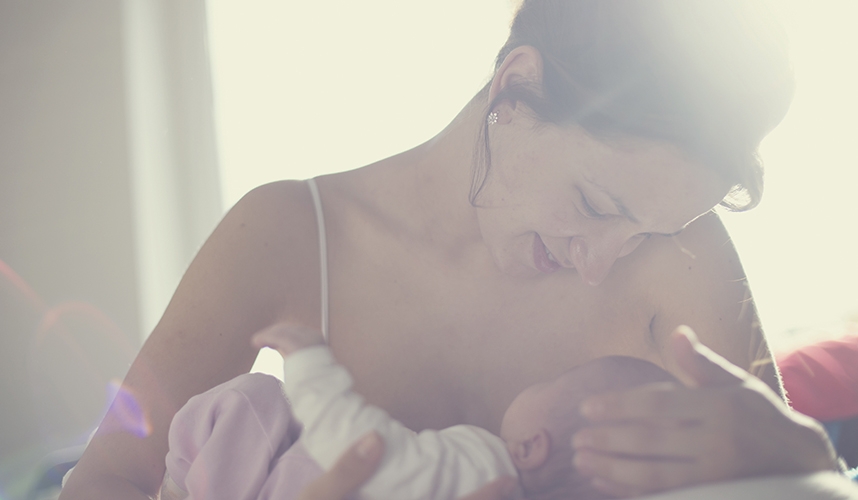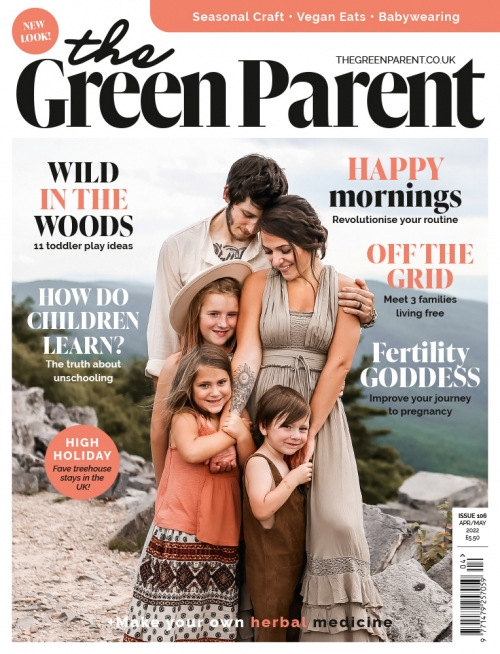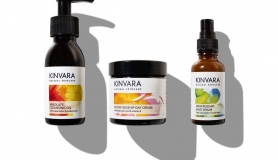How many parenting books do you own? Lots? If so, you’re not alone. It has become a Western societal norm to head straight to the Parenting & Childcare section of the bookshop when expecting a baby. And what an array of advice you’ll find! With so many opinions on the “best” way to get your baby to sleep, how to feed, how to settle and soothe, it is – unsurprisingly – overwhelming. New mothers, especially, can fall prey to the sheer volume of “expert” advice out there telling us how to raise our babies. But with such wildly varying theories on how to look after baby, it can lead to a loss of self-belief and, worse, serve to damage that precious parent/child bond.
So what if we looked elsewhere? What if, rather than looking to outside expert help, we instead looked inwards – beyond learned knowledge and back to that quiet, primal instinct we all have within? How would we parent our baby differently?
Sometimes, we have learned so much about parenting that we can no longer hear our own instinct calling to us. But, just like other mammals, we do know what to do. We know instinctively.
EARLY DAYS
From the moment they are born, babies need to feel the closeness of their mother – for warmth; for safety; for milk. And the usual maternal instinct is to respond to this need. We see this in the animal kingdom. The mother wolf, for example, sleeps with, feeds and comforts her young. As humans, we are no different. Our natural response when our baby cries is to cuddle them close to our heart, rock them gently, “shush” quietly to them and offer milk. This is instinctive. We intuitively provide them with the elements that help to mimic their environment in the womb – warmth; the sound of our heart beating and the “shushing” rush of our blood; gentle movement; and sustenance.
By responding instinctively to our baby’s needs, we are in turn respecting their own instinctive nature and providing them with the security they crave. But more than that, we are also helping to lay the foundations for brain development and the formation of emotional intelligence.
There have been many studies that demonstrate babies who are kept close to their mother (the natural instinct) have lower stress levels, including more balanced levels of the stress hormone, cortisol. Their basic physiology is also more stable, including their heart rate and temperature. What’s more, acting instinctively by keeping your child close during infancy can have huge long-term benefits, including lower levels of anxiety, greater happiness and increased feelings of self-worth. Children raised instinctively are also likely to be more autonomous in later life – one 2004 study from the University of California found that children who co-slept with parents from birth actually became more self-reliant later in life and exhibited more social independence.
The parental benefits of caring for your baby instinctively are also huge. Acting on your instincts rather than following a set of “instructions” will give you greater confidence, leading to lower stress levels, increased happiness and a stronger bond with your baby. After all, if you’re following your heart and trusting your instinct, there’s no way you can go wrong; even if you aren’t perfect, instinctively caring for your baby will be, at the very least, good enough. And that really is good enough.
PARENTING WITH WOLVES
So thinks Sherry Bevan, coach, breastfeeding counsellor and author. In her book The Confident Mother – not a parenting book, but simply ‘a way of getting the message across to mothers the importance of focusing on the things you feel are important’ – Sherry recounts her own journey to motherhood. She reveals that when she didn’t know what to do while caring for her baby, ‘I didn’t turn to a parenting book. No, I turned to Mummy Wolf. What would she do? What would her mothering instincts tell her to do? What are my instincts telling me to do?’
The book documents Sherry’s interviews with more than 20 mothers, providing evidence-based research on why it’s important to trust yourself… and to keep baby close.
‘As a breastfeeding counsellor, I wanted to get it out there that keeping your baby close to you will help with their brain development,’ says Sherry. ‘This knowledge of neuroscience has been out in the public domain for years, and yet it’s not common knowledge. So much of the advice out there that new mothers receive is not evidence-based. The number of times you hear that a baby “shouldn’t be waking in the night any more – they can’t be hungry”, is crazy. They’re waking in the night because that’s normal for babies. We’ve lost so much of what normal looks like. You can even take your six-month-old baby to a sleep clinic these days. There’s nothing wrong with this baby. He’s just being a baby!’
Sherry is concerned there is so much information and advice out there, it is smothering women’s instincts when they become mothers. ‘These days, it can feel like you have to go against all the trends to be an instinctive parent,’ she says. ‘It can be easy to get babies into a sleep routine and think you have to get them on a four-hour schedule for feeding, because there’s so much help out there to do this. You have to know you want to do something different, when in fact doing something different is being normal. It’s all back to front.’
Sherry feels if mothers could really close themselves off to this advice and the need to get babies into a routine, so many of the pressures of parenthood would be relieved: ‘Parenting naturally, in accordance with your baby’s needs, is so much more relaxing, because you’re not constantly fighting to stick to the schedule. If you can learn to trust your instincts and have confidence in what you do, you’ll actually be fine.’
So, what does Mummy Wolf do? She is gentle with her babies yet fiercely protective; she keeps them close for safety, security and warmth; she feeds and nurtures them.
Sounds simple? It is.
“Acting on your instincts rather than following a set of 'instructions' will give you greater confidence, leading to lower stress levels and increased happiness”
WHY THE CHANGE?
With all the benefits of caring for your baby in this natural way, coupled with its simplicity, why did anyone ever decide to parent differently?
The move away from an instinctive, child-led style of parenting in favour of a more parent-centric version is a Western phenomenon. The introduction of the “cry it out” theory of child raising is thought to originate from an 1895 book, The Care And Feeding Of Children by Dr Emmett Holt. It’s an idea that took hold, despite the fact it is not an evidence-based practice. Controlled crying is a sleep-training method that’s now offered as a solution in many parenting books today. The underlying message is that a baby is somehow trying to manipulate you with its crying (a dangerous concept, given the fact babies are instinctive beings who do not yet have the brain capacity for such manipulation).
But leaving a baby to cry goes against the maternal instinct. In fact, one such parenting book even asserts that by practising controlled crying, “You are bound to be feeling guilty.”
Guilt is a signpost to the fact you’re going against your core values. And for your baby, there are worse implications: once a baby has cried itself to sleep, its cortisol (stress hormone) levels remain sky high. Cortisol can be toxic to the developing brain, so to have this hormone flooding through your baby is very far from ideal. Allowing your baby to cry it out and avoiding contact with them also teaches learned helplessness – that nothing they do has an impact in the world – which can lead to depression (both in infancy and later life) and self-confidence issues.
Would Mummy Wolf leave her cub crying and distressed? Undoubtedly not.
PARENTING AS A VILLAGE
There are, of course, cultures around the world where the focus of parenting has never shifted; where natural parental instincts are followed, trusted and celebrated. In these parts of the world, the child has always been central. It is not odd here to practice instinctive parenting – it’s not strange to immediately comfort your baby when they cry; to carry them with you; to sleep beside them for security and warmth; to breastfeed well into their fourth or fifth year, providing nutrition and comfort.
While all tribes have their own unique traditions and lifestyles, these common childcare practices can be seen time and time again, from traditional Arctic Inuit to indigenous African communities. And the one thing these practices ensure? Baby is never alone.
It makes intuitive sense that a human so small should be in the constant company of a caregiver – whether that’s the parents, older siblings or the wider “village”. As the infant becomes older and more capable, they are then able to go off and explore – indeed, they are trusted to do so and their upbringing helps give them a sense of autonomy and confidence that enables this independence. Of course, there is always the knowledge that other members of the tribal community will be there to look out for the child, should assistance be needed – something that, on the whole, has been lost from our Western society. And so, as well as a loss of instinct, something else is at play here.
‘Because of advances in technology, communication and transportation, we don’t live within our family units anymore,’ says Sherry. ‘Families are so broken up now in our own society, so although I think parenting should be instinctive, there is also the issue that we no longer experience parenting in the extended family – we no longer live with, or near to, brothers and sisters who are parenting their children alongside us. We also have fewer children these days, so there are fewer example of how to parent as our children grow up.’
Perhaps, as tribal living demonstrates, there is a valuable place for learning from the community alongside your own instincts as a parent. But one thing is for sure – if you read something in a parenting manual or get offered advice that does not sit well with you, it means this is going against your instinct. And if something feels instinctively wrong to you, it probably is.
It’s time we started to trust our instincts a little more. After all, that’s what Mummy Wolf would do, isn’t it?
FOLLOW YOUR HEART
Jo Boyce, 34, a technical editor from Kent and mum to Oliver, five, and Imogen, two, followed her heart when it came to caring for her babies – and says they are more confident children as a result
“I’ve never really identified with one parenting style – we have used cots and buggies, but I also babywear, we cosleep and we’re doing extended breastfeeding. I would rather do what I feel is right for my child, not what a book says.
As soon as I became a mum, one thing I knew for sure was there was no way I’d ever leave my child to cry. It would have been absolutely against my instincts. I also knew I didn’t want to sleep train at night. Oliver was a baby who needed to have somebody with him. He’d get distressed quickly if he was left alone, so I wanted to be there for him and parent him the way he needed, not the way that was convenient for me. I didn’t want to stop being a parent just because of the time on the clock. I had a lot of “making a rod for your own back” comments from other people, but he needed to be near somebody at night. Now he’s at school and he sleeps really well. I feel like giving him what he needed during the night for those earlier years paid dividends when it came to him finally gaining the maturity to be able to sleep for longer.
On top of this, my children have a real confidence about them – they’ll go off and explore and find out about things. I feel this is because they know I’ll always be there for them, no matter what. I hope that I’ve taught them I’m here whenever they need me.”







